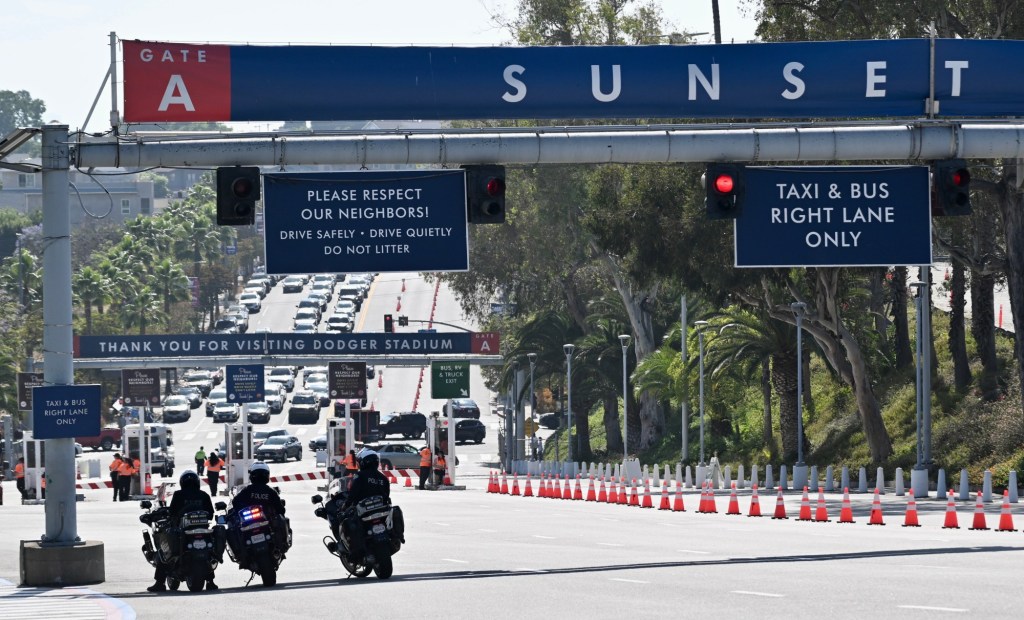Concerns over ICE raids in Los Angeles have sparked a significant incident at Dodger Stadium. On Thursday morning, federal agents encountered resistance as they attempted to access the stadium. Footage revealed approximately 20 vehicles being turned away from Gate A by security personnel, a scenario mirrored at Gate E shortly afterward.
The identity of the federal agents—whether they were from Immigration and Customs Enforcement (ICE), Border Patrol, or both—remains uncertain, as both agencies operate under the Department of Homeland Security. News reports captured the agents’ vehicles parked outside the stadium before they were escorted away by Los Angeles police around noon, shortly after protesters began gathering.
The Dodgers addressed the situation in an official statement, confirming, “ICE agents came to Dodger Stadium and requested permission to access the parking lots. They were denied entry to the grounds by the organization. Tonight’s game will be played as scheduled.” In response, the Department of Homeland Security took to social media to clarify that no operation was planned at the stadium, stating, “This had nothing to do with the Dodgers. CBP vehicles were in the stadium parking lot very briefly, unrelated to any operation or enforcement.”
The Dodgers have faced criticism for their silence amid ongoing civil unrest over the past fortnight, following aggressive ICE actions and the deployment of National Guard troops by President Donald Trump, contrary to the wishes of California Governor Gavin Newsom and Los Angeles Mayor Karen Bass. However, the team recently indicated plans to support immigrant communities through various programs and donations—although a scheduled announcement was postponed in light of Thursday’s events. Team president Stan Kasten stated, “Because of the events earlier today, we continue to work with groups that were involved with our programs but we are going to have to delay today’s announcement while we firm up some more details. We’ll get back to you soon with the timing,” while refraining from commenting directly on the day’s events.
Federal agents arrived at the stadium gates around 8 a.m., prompting an increased police presence. Initially, officers formed a barrier at Gate E, where protesters gathered, holding signs reading messages such as “ICE out of LA” and advocating against immigration enforcement practices. Authorities warned that crossing the gate would result in arrest before ultimately dismantling the police line at about 12:30 p.m.
A group of approximately 24 protesters, some wearing Dodgers apparel, remained at the gates after news spread that the team had denied ICE entry. Councilmember Eunisses Hernandez stated she had been in contact with the team and the mayor’s office, saying, “We’re waiting to see that movement happen here,” concerning the federal agents’ presence.
The Dodgers’ history with the Latino community is complex, marked by past injustices during the construction of Dodger Stadium in the 1960s. However, the arrival of pitcher Fernando Valenzuela in the 1980s helped mend this relationship. Today, Latino fans represent a substantial portion of the Dodgers’ supporter base. One notable player, Kiké Hernandez, expressed his concerns via Instagram, saying, “I may not be Born & Raised, but this city adopted me as one of their own. I am saddened and infuriated by what’s happening in our country and our city… ALL people deserve to be treated with respect, dignity and human rights. #CityOfImmigrants.”
Protests continued as fans queued for Thursday’s game, with singer-songwriter Amanda Carrera voicing her disappointment, declaring, “For the Dodgers to be quiet up until this point is very disappointing. … It’s heartbreaking to know that the team you love doesn’t love you back.” Carrera plans to boycott future games, emphasizing, “As much as I love my Dodgers, I love my people more.”
In a related cultural moment, the L.A. City Council recently welcomed musician Nezza, who performed a Spanish rendition of the National Anthem in defiance of earlier instructions not to do so at a Dodgers game. Councilwoman Monica Rodriguez praised Nezza’s performance, highlighting the ongoing issues of racial profiling and community targeting. Nezza’s rendition has gained viral attention, following a behind-the-scenes video revealing team representatives advising her to perform in English instead.
The unfolding events at Dodger Stadium reflect a broader tension felt throughout Los Angeles as residents grapple with immigration enforcement and community rights, spotlighting the Dodgers’ role and response to these critical social issues.

